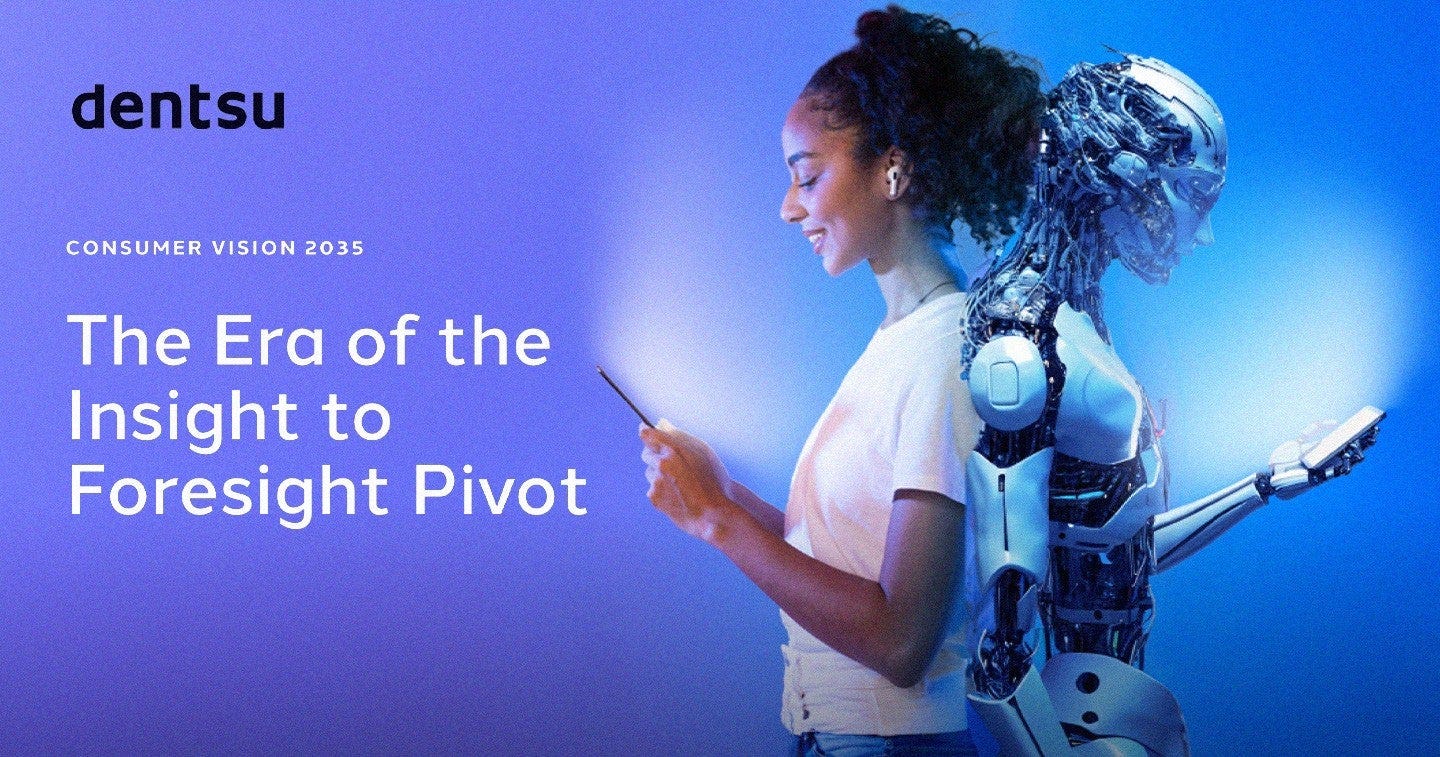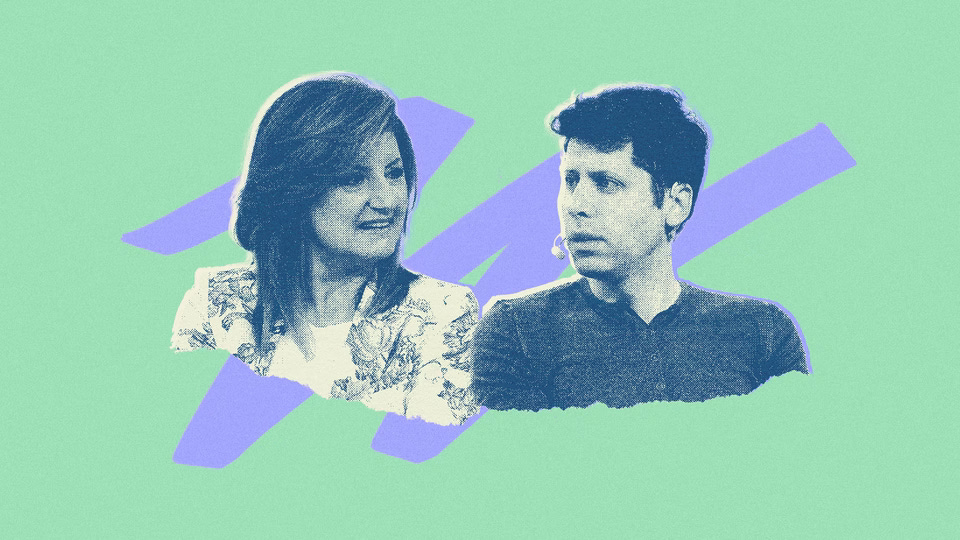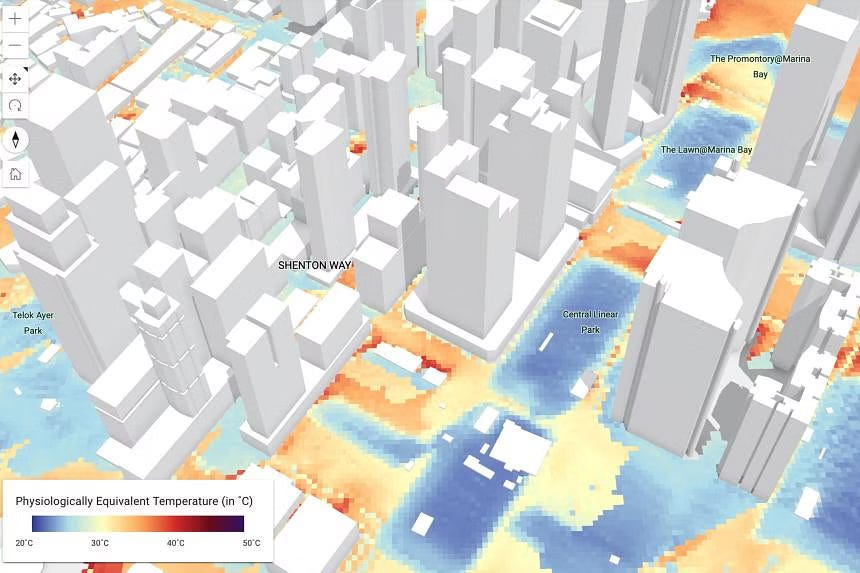What will 2035 look like?
Going from tech-curious to tech-literate can be simple if you have access to the right resources. Here are some recent highlights to keep you informed:
Welcome to the new subscribers who have joined us since the last newsletter! Here are some recent highlights to keep you informed:
Dentsu recently published it’s Consumer Vision 2035 report. It analyses data from 30,000 global consumers to explore how AI, climate change and cultural shifts are converging to reshape our world.
The report also highlights the critical trends marketers will need to navigate to stay relevant:
AI - The new consumer ally:
Consumers are increasingly comfortable using AI for everyday tasks. According to the report, by 2035, half of global consumers expect to use AI clones for shopping, administrative duties, and communications.
For example, a consumer might currently use ChatGPT to source travel destinations, which then evolves to AI that plans the trip itinerary and interfaces with other AIs to purchase the airplane tickets for you.
Dentsu predicts this will create a business environment where brands increasingly sell to AI assistants rather than humans, with machines handling numerous transactions without direct human intervention.
In this environment, brands may need to form partnerships with AI systems as a means for access and influence over consumers’ many points of decision, while building sensory experiences that feel personal to the customer.
Customised Reality:
By 2035, technology will be seamlessly integrated into daily life through voice, haptics, and gestural technologies.
Personalised data will enhance this experience by tracking emotional and physical responses. Consumers will navigate their worlds using intuitive technology (e.g. AI smart glasses) rather than screens to reduce the negative effects of tech-heavy living.
While predictive brands will attract consumers, they will also seek spontaneity and serendipity, making disruptive brands relevant.
Climate in Command:
Economic growth will face environmental and societal ceilings. Environmental issues will impose lifestyle limits and this new reality will shape culture.
Growth opportunities will shift to emerging markets with less developed infrastructure, requiring businesses to address climate change and support their communities. According to the report, 74% of respondents said they trust businesses more than governments to help address the critical social, economic and environmental problems we face.
First-mover advantage will go to brands that become trusted entities in new cultural centers by creating jobs, fostering new industries and amplifying local voices in emerging regions.
What do you think? Read the full report here.
Last week, Sam Altman and Arianna Huffington announced the launch of Thrive AI Health.
It’s a new company developing an AI health coach to give personalised health recommendations using people’s biometrics and lifestyle habits as references.
On the one hand, using AI in this way would scale and democratise the life-saving benefits of improving daily habits and address growing health inequities.
Chronic diseases are often unevenly distributed across demographics and a personalised AI health coach could make healthy behaviour changes easier and more accessible. It could also tailor recommendations to what motivates each individual.
Sam Altman said that his decision to join Huffington stemmed partly from hearing that people use ChatGPT to self-diagnose medical problems, while Huffington has said that the technology will be personalised enough to meet the individual, behavioural-change needs that current health systems don’t meet.
On the other hand, their vision puts a positive spin on one of AI’s sharpest double-edges.
AI models are already adept at persuading people, and we don’t know how much more powerful they could become as they advance and gain access to more personal data.
There are also significant privacy issues, as companies could train their models on hyper-personal, confidential information. They’re asking the world to trust that generative AI - a technology that currently struggles to reliably cite its own sources - can transform our relationship with our health.
What do you think?
Singapore has developed the world’s first digital twin of a country.
Over the last four years, more than 20 researchers have built a “digital twin” of Singapore to assess and mitigate urban heat, addressing the urban heat island effect which makes densely built areas up to 7°C hotter than less developed regions.
Traditional methods of studying this issue are time-consuming and resource-intensive. The Digital Urban Climate Twin project offers a solution by allowing authorities to simulate various scenarios digitally to figure out how to make living spaces more thermally comfortable for people.
Recent years have shown the extent at which the climate crisis is amplifying. As a result, countries like Singapore are finding ways to better respond and adapt to the environmental challenges in a climate change context, beyond what can be currently done with the existing sources of climate information.
The Earth initiative of the European Commission is also another example, aimed at developing a digital replica of our planet, with digital twins simulating different aspects of the Earth system. One of The Earth initiative’s digital twins will provide a new capability to determine the impacts of scenarios or policies on the climate system at global, regional and local scales, several decades ahead using cutting-edge simulations.
What do you think?
If you liked reading this, feel free to click the ❤️ button on this post so more people can discover it on Substack 🙏
If you haven’t already, subscribe now to make sure you don’t miss out on any future newsletters.
Also, feel free to hit reply and ask me any questions you have about tech and I can include it in the next issue!
For regular content, you can follow me at:
If you know anyone else who you think would enjoy this content, you can share the newsletter from here:






